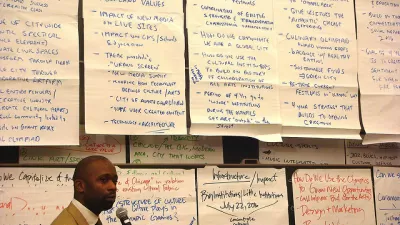In a compelling entry into the public dialog around placemaking, Project for Public Spaces argues that people, rather than merely places, create vibrancy in a community.
As it gears up for the first meeting of the Placemaking Leadership Council in Detroit from April 11-12, planning nonprofit Project for Public Spaces (PPS) has come out with an article clarifying the connection between placemaking and gentrification, the essential elements of a successful placemaking process, and the potential pitfalls of "creative placemaking."
One topic the article tackles is the the rise of the “creative” modifier in the debate around placemaking. Based on a misinterpretation of Richard Florida's Rise of the Creative Class, argues PPS, creative placemaking shifts the emphasis from inclusiveness to exclusivity and competition. Rather than treating cities and neighborhoods as already existing communities, the pitfall of this kind of placemaking is the assumption of a tabula rasa urban condition open to importing community members and economic drivers and causing gentrification. It can also put cities in competition with one another to attract and retain a creative workforce rather than focusing on improving local resources.
While identifying the typical markers of vibrancy as active art and music scenes and plenty of restaurants, PPS argues that ultimately "people are vibrancy" and that the most important provision of placemaking is a forum for ongoing community conversations, not simply the best place to have gelato.
FULL STORY: Placemaking: Shared focus on place builds vibrant destinations

Planetizen Federal Action Tracker
A weekly monitor of how Trump’s orders and actions are impacting planners and planning in America.

Maui's Vacation Rental Debate Turns Ugly
Verbal attacks, misinformation campaigns and fistfights plague a high-stakes debate to convert thousands of vacation rentals into long-term housing.

Restaurant Patios Were a Pandemic Win — Why Were They so Hard to Keep?
Social distancing requirements and changes in travel patterns prompted cities to pilot new uses for street and sidewalk space. Then it got complicated.

In California Battle of Housing vs. Environment, Housing Just Won
A new state law significantly limits the power of CEQA, an environmental review law that served as a powerful tool for blocking new development.

Boulder Eliminates Parking Minimums Citywide
Officials estimate the cost of building a single underground parking space at up to $100,000.

Orange County, Florida Adopts Largest US “Sprawl Repair” Code
The ‘Orange Code’ seeks to rectify decades of sprawl-inducing, car-oriented development.
Urban Design for Planners 1: Software Tools
This six-course series explores essential urban design concepts using open source software and equips planners with the tools they need to participate fully in the urban design process.
Planning for Universal Design
Learn the tools for implementing Universal Design in planning regulations.
Heyer Gruel & Associates PA
JM Goldson LLC
Custer County Colorado
City of Camden Redevelopment Agency
City of Astoria
Transportation Research & Education Center (TREC) at Portland State University
Jefferson Parish Government
Camden Redevelopment Agency
City of Claremont




























